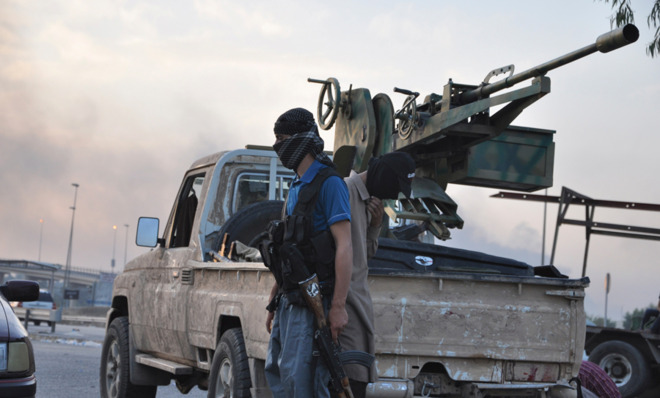Iraq was not a threat to the U.S. in 2003. Now it is.
Many Americans are understandably wary about being pulled back into Iraq. But this time is different.

A free daily email with the biggest news stories of the day – and the best features from TheWeek.com
You are now subscribed
Your newsletter sign-up was successful
America is rightly scarred by the dishonest way President George W. Bush and his political allies roped us into invading Iraq. We were told it was in response to 9/11. We were told Saddam Hussein was in league with al Qaeda. We were told Iraq was stockpiling weapons of mass destruction. We fell for a bait-and-switch as Bush demanded, then ignored, United Nations-led weapons inspections. As the casualties piled up in Iraq, the public's anger was so raw it led to the Republican loss of Congress and the White House. And the relief we felt when President Barack Obama pulled our troops out in 2011 was palpable.
But 2014 is not 2003. Iraq wasn't about al Qaeda before. It is now.
The terrorist organization that is now marching toward Baghdad — the Islamic State of Iraq and Syria — was formerly known as al Qaeda in Iraq and claims the mantle of Osama bin Laden. It previously sought to work with al Qaeda central, a badly weakened network led by bin Laden's right-hand man Ayman al-Zawahiri, but ISIS has clearly eclipsed al Qaeda as the premier militant extremist organization in the region.
The Week
Escape your echo chamber. Get the facts behind the news, plus analysis from multiple perspectives.

Sign up for The Week's Free Newsletters
From our morning news briefing to a weekly Good News Newsletter, get the best of The Week delivered directly to your inbox.
From our morning news briefing to a weekly Good News Newsletter, get the best of The Week delivered directly to your inbox.
We may want to say ISIS is Iraq's problem, but an Iraq run by ISIS is everyone's problem.
Acknowledging that reality does not mean the neoconservatives who criticized the 2011 pullout have been right all along. It's their blunderbuss invasion that cracked open Iraq's sectarian divides, and we have no obligation to accept their Johnny-One-Note militarism as the easy answer today. Replicating the mistakes of 2003 with another round of bloody unilateralism may heighten global suspicion of American imperialism, which is exactly what makes al Qaeda thrive.
But while we should avoid repeating the mistakes of 2003, we shouldn't pretend that the year is still 2003 either. We are not being lied to, we are not snubbing the international community, and we don't have a defense secretary who prattles on about "unknown unknowns."
If we still recoil at military occupation, we need not blithely reject any form of military action — such as drones, air strikes, or special operations — especially if it can be done with the support of the Iraqi government, international partners, and the United Nations. Embarking on a multilateral course would be learning from, not repeating, our past mistakes.
A free daily email with the biggest news stories of the day – and the best features from TheWeek.com
What Bush did to get us in, or what Obama did to get us out, is not relevant to the question of what to do now. The White House should be given the latitude to thoroughly assess the situation as it stands and consider all possible military and diplomatic options, without worrying about knee-jerk reactions from both ideological flanks rooted in the outdated circumstances of the past.
Furthermore, even multilateral military action would only be one element of a broader strategy. As Obama said on Friday, without a "political effort" to resolve Iraq's internal disputes, "short-term military action — including any assistance we might provide — won't succeed." In all likelihood, a nuanced combination of military and diplomatic tactics will be necessary to eliminate the threat of ISIS, while better integrating Iraq's Sunni minority into the country's government.
An armed response would not be a betrayal of principle for the man who became president because he presciently declared in 2002 that Iraq would be a "dumb war." Recall what Obama also said that day 12 years ago: "After Sept. 11, after witnessing the carnage and destruction, the dust and the tears, I supported this administration's pledge to hunt down and root out those who would slaughter innocents in the name of intolerance, and I would willingly take up arms myself to prevent such tragedy from happening again."
That is exactly what he is trying to prevent today.
Bill Scher is the executive editor of LiberalOasis.com and the online campaign manager at Campaign for America's Future. He is the author of Wait! Don't Move To Canada!: A Stay-and-Fight Strategy to Win Back America, a regular contributor to Bloggingheads.tv and host of the LiberalOasis Radio Show weekly podcast.